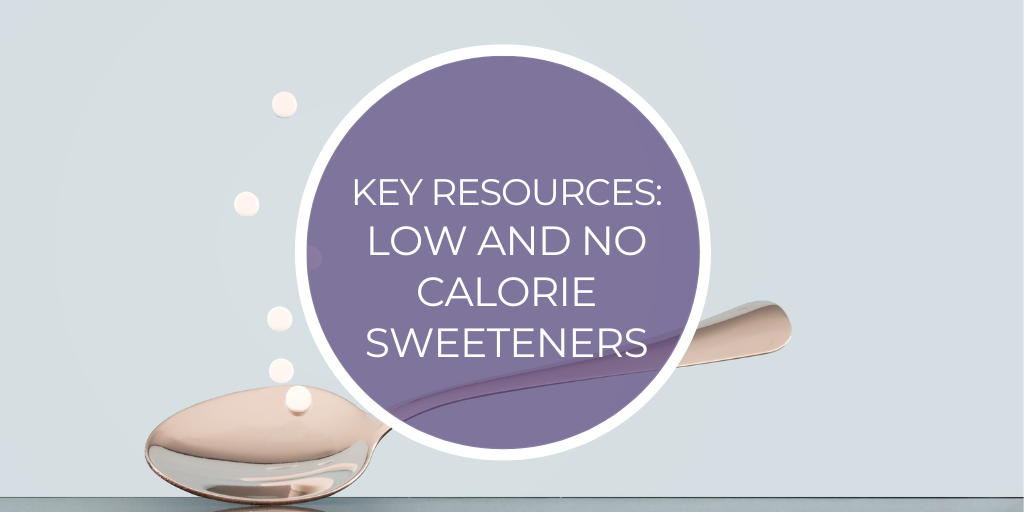Following on from our roundtable on low and no calorie sweeteners – your questions answered, we’ve pulled together some of the key resources and references discussed within the webinar. If you missed the live webinar, you can register to watch the recording.
WHO Guidelines and related articles
Use of non-sugar sweeteners: WHO guideline (2023). World Health Organisation (WHO).

Comments and responses on WHO draft guideline (2023). WHO.
WHO guideline on the use of non-sugar sweeteners: a need for reconsideration (2023). Khan TA et al.
Aspartame:
Summary of findings of the evaluation of aspartame at the International Agency for Research on Cancer (IARC) Monographs Programme’s 134th Meeting, 6–13 June 2023 and The JOINT FAO/WHO EXPERT COMMITTEE ON FOOD ADDITIVES (JECFA) (2023). Joint FAO/WHO Expert Committee on Food Additives (JECFA)/International Agency for Research on Cancer (IARC).
Joint FAO/WHO Expert Committee on Food Additives. Ninety-sixth meeting (Safety evaluation of certain food additives) 27 June-6 July 2023. Summary and Conclusions. (2023). Joint FAO/WHO Expert Committee on Food Additives (JECFA)
Carcinogenicity of aspartame, methyleugenol, and isoeugenol (2023). Riboli E et al.
Perspectives on recent reviews of aspartame cancer epidemiology (2023). Goodman JE et al.
Position Statement – Diabetes
The use of low or no calorie sweeteners. Position Statement (Updated December 2018). Diabetes UK.
Studies
Evidence-based European recommendations for the dietary management of diabetes (2023). Diabetes and Nutrition Study Group (DNSG) of the European Association for the Study of Diabetes (EASD).
Facilitating Positive Health Behaviors and Well-being to Improve Health Outcomes: Standards of Care in Diabetes (2023). ElSayed NA, et al.
The Effect of Non-Nutritive Sweetened Beverages on Postprandial Glycemic and Endocrine Responses: A Systematic Review and Network Meta-Analysis (2023). Zhang R, et al. Nutrients. 2023;15(4):1050.
Health effects of the use of non-sugar sweeteners: a systematic review and meta-analysis (2022). WHO.
Association of Low- and No-Calorie Sweetened Beverages as a Replacement for Sugar-Sweetened Beverages With Body Weight and Cardiometabolic Risk: A Systematic Review and Meta-analysis (2022).McGlynn ND, et al.
Relation of Change or Substitution of Low- and No-Calorie Sweetened Beverages With Cardiometabolic Outcomes: A Systematic Review and Meta-analysis of Prospective Cohort Studies (2022). Lee JJ, et al.
The effects of low-calorie sweeteners on energy intake and body weight: a systematic review and meta-analyses of sustained intervention studies (2021). Rogers P et al.
The effects of low-calorie sweeteners on energy intake and body weight: a systematic review and meta-analyses of sustained intervention studies (2021).Rogers PJ, Appleton KM.
Effects of non-nutritive sweeteners on body weight and BMI in diverse clinical contexts: Systematic review and meta-analysis (2020). Laviada-Moline H et al.
Effects of nonnutritive sweeteners on body weight and BMI in diverse clinical contexts: Systematic review and meta-analysis (2020). Laviada-Molina H, et al.
Acute glycemic and insulinemic effects of low-energy sweeteners: a systematic review and meta-analysis of randomized controlled trials (2020). Greyling A, et al.
Expert consensus on low calorie sweeteners: facts, research gaps and suggested actions. (2020). Ashwell M, et al.
Low-/No-Calorie Sweeteners: A Review of Global Intakes. Nutrients (2018). Martyn D, et al..
Biological fate of low-calorie sweeteners (2016). Magnuson BA, et al.
International Sweeteners Association (ISA)

A critical appraisal of the WHO reviews of aspartame (2023).
Low/no calorie sweeteners: Role and benefits. A guide to the science of low/no calorie sweeteners (2023). Booklet for health professionals.
Sweet talk on diabetes: How can low/no calorie sweeteners help? (2023). Factsheet

Resources. Various resources for health professionals.
World Cancer Research Fund (WCRF)

Aspartame and Cancer Risk (2023).
Social Media for Webinar Speakers
@DrDuaneRD (Twitter) and Duane Mellor (LinkedIn) for Dr Duane Mellor – Webinar chair

Rebeca Lopez-Garcia (LinkedIn) for Rebeca Lopez-Garcia – Key note speaker

@nicsnutrition(Twitter), @nicsnutrition (Instagram) and Nichola Ludlam-Raine (LinkedIn) for Nichola Ludlam-Raine, Registered Dietitian – Panel expert

Matthew Lambert (LinkedIn) for Matthew Lamber – Panel expert

YOU MAY ALSO BE INTERESTED IN:
Sweeteners and Diabetes – Friend or Foe?






